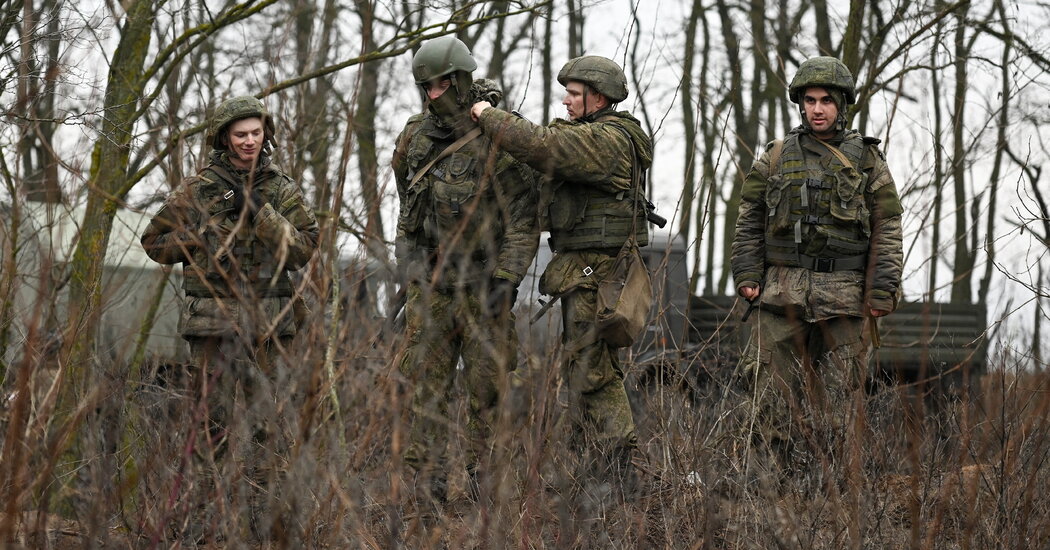
KYIV, Ukraine — Russia demanded on Friday that the United States and its allies halt all military activity in Eastern Europe and Central Asia in a sweeping proposal that would establish a Cold War-like security arrangement, posing a challenge to diplomatic efforts to defuse Russia’s growing military threat to Ukraine.
The Russian proposal — immediately dismissed by NATO officials — came in the form of a draft treaty suggesting NATO should offer written guarantees that it would not expand farther east toward Russia and halt all military activities in the former Soviet republics, a vast swath of now-independent states extending from Eastern Europe to Central Asia.
The proposals codified a series of demands floated in various forms in recent weeks by Russian officials, including by President Vladimir V. Putin in a video call with President Biden. They represent in startling clarity goals long sought by Mr. Putin, who analysts say is growing increasingly concerned that Ukraine is drifting irretrievably into a Western orbit, posing a grave threat to Russian security.
The demands also reinforced the notion that Mr. Putin seemed willing to take ever-greater risks to force the West to take Russian security concerns seriously and to address historical grievances largely ignored for decades.
Russia’s deputy foreign minister, Sergei A. Ryabkov, laid out details about the proposal in public for the first time on Friday in a video news conference in Moscow, amid a Russian troop buildup near Ukraine’s border that Western officials have interpreted as a threat of an invasion.
The demands went far beyond the current conflict between Ukrainian government forces and Russia-backed separatists in eastern Ukraine. And most were directed not at Ukraine, which is threatened by the troop buildup, but at the United States and Ukraine’s other Western allies.
They included a request for a NATO commitment that it would not offer membership to Ukraine specifically. But NATO officials emphasized that NATO countries will not rule out future membership for any Eastern European countries, including Ukraine.
The proposal highlighted starkly differing views in the United States and Russia on the military tensions over Ukraine. Russia has insisted that the West has been fomenting the crisis by instilling anti-Russia sentiment in Ukraine, and by providing weapons. Mr. Ryabkov cast the confrontation in Ukraine as a critical threat to Russia’s security.
The United States and European allies, in contrast, say Russia provoked the security crisis by recently deploying tens of thousands of troops near Ukraine’s border.
NATO officials said on Friday that Russia’s proposals were unacceptable in their demands for veto power over now-independent countries. They emphasized their openness to a diplomatic dialogue on Russia’s security concerns, but said that any discussion would also include NATO’s security concerns about Russian missile deployments, satellite tests and disinformation efforts.
The officials also suggested that if Russia did make a major new military incursion into Ukraine, as it seems to be planning, NATO would strongly consider moving more troops into allied countries bordering Ukraine, like Poland and the Baltic countries, because the “strategic depth” against Russia that Ukraine now provides would be damaged or lost.
Jake Sullivan, President Biden’s national security adviser, said in Washington on Friday that while the Russians had a list of security concerns, so did the United States and its European allies, and that Washington was willing to negotiate on that basis.
“We’ve had a dialogue with Russia on European security issues for the last 20 years,” Mr. Sullivan told an audience at the Council on Foreign Relations. “We had it with the Soviet Union for decades before that.”
That process “has sometimes produced progress, sometimes produced deadlock,” he said, noting that the United States planned “to put on the table our concern with Russian activities that we believe harm our interests and values.”
“It’s very difficult to see agreements getting consummated,” he added, “if we’re continuing to see an escalatory cycle.”
He declined to say if the United States was willing to provide Ukraine with more powerful defensive weapons, saying a $450 million arms and security package is already in place. He said the pipeline was already so full there is a question of “absorptive capacity.”
The Russian proposal took the form of two draft treaties, one with NATO and the other with the United States.
“Member states of the North Atlantic Treaty Organization accept the obligation to exclude farther expansion of NATO to Ukraine and other states,” the text suggested. In demanding the written guarantee from NATO, Mr. Putin and other Russian officials have reached into early post-Cold War history, describing what they see as a betrayal by the West in 1990.
They assert that NATO expanded to the east despite a spoken assurance from James Baker, then the secretary of state, to the Soviet leader, Mikhail S. Gorbachev, that it would not.
The agreement was never put in writing and Mr. Baker said later that Russian officials misinterpreted his comment, which applied only to the territory of the former East Germany. Mr. Gorbachev has, in interviews, confirmed that spoken assurance came in discussions only of East Germany.
The new Russian proposal surfaced other historical grievances.
It demanded that NATO withdraw military infrastructure placed in Eastern European states after 1997, the date of an accord signed between Russia and NATO that Moscow wants now as a starting point for a new security treaty.
The Russian Foreign Ministry had earlier demanded that NATO officially abrogate a 2008 promise, known as the Bucharest Declaration, that Ukraine and Georgia would be welcomed into the alliance. The NATO chief invoked that declaration after the meeting with Ukraine’s president, Volodymyr Zelensky, on Thursday, saying the offer still stands.
Russia is also insisting that NATO countries do not deploy offensive weapons in states neighboring Russia, including countries not in the alliance — a reference to Ukraine. And the proposal suggested a ban on military exercises at strengths of more than a brigade in a zone along both sides of Russia’s western border, an issue that would address the current military buildup near Ukraine.
Analysts expressed concerns about the Russian demands, saying they appeared to set up any talks between Russia and the West on these “security guarantees” for failure, possibly paving the way for a war in Ukraine.
Understand the Escalating Tensions Over Ukraine
But they might also represent an opening position, with Russia willing to later compromise in talks. That the demands were put forth by the deputy foreign minister, Mr. Ryabkov, and not by his boss, Sergey V. Lavrov, or by Mr. Putin himself, left wiggle room, analysts said.
“There is a lot of shadow boxing going on, on all sides, and it’s not clear how this ends,” said Samuel Greene, a professor of Russian politics at King’s College in London. “This whole situation is ambiguous by design.”
Analysts pointed out that Mr. Putin had tried to extract similar concessions from President Trump but failed.
Mr. Greene said Russia may now see an opening to renegotiate the post-Soviet security landscape while Ukraine is still weak but likely to become stronger, Western nations are distracted by the pandemic and other problems and the U.S. is more concerned with the Chinese threat to Taiwan.
Putting forward impossible demands was intended to complicate diplomacy over the Russian buildup on the Ukrainian border, said Samuel Charap, a Russian security analyst at the RAND Corporation. “Diplomacy requires compromise and flexibility,” he said. “It usually entails avoiding public ultimatums. Basically, this is not diplomacy. It’s the opposite of diplomacy.”
Mr. Ryabkov, the Russian diplomat, said Moscow was open to “reasonable” compromises. But he also suggested the Kremlin has assessed the United States’ power as waning and that a new accord is justified.
Analysts say that negotiating such wide-ranging new security accommodations would most likely take many months, if they can be accomplished at all. Mr. Putin may have to decide at an earlier moment whether to go ahead with an invasion because the troops garrisoned now at temporary sites near the Ukrainian border cannot remain there indefinitely.
Ukrainian officials have suggested that the U.S. withdrawal from Afghanistan in August helped precipitate the crisis by signaling waning American resolve for overseas commitments, which emboldened the Kremlin.
The Biden administration has vowed to remain engaged in the international arena and said it intended to repair relationships strained under President Trump. American officials have consistently said they are committed to supporting Ukrainian sovereignty.
Mr. Putin has come close to openly acknowledging that he is using military force to coerce the West to negotiate, though his spokesman has denied this. Mr. Putin has said Western countries were realizing Russia was serious about defending “red lines” related to NATO forces near its borders.
“Our recent warnings have indeed been heard and are having a certain effect,” he told a gathering of Russian diplomats in November. “Tensions have risen.”
Andrew E. Kramer reported from Kyiv, Ukraine, and Steven Erlanger reported from Brussels. David E. Sanger contributed reporting from Washington.







